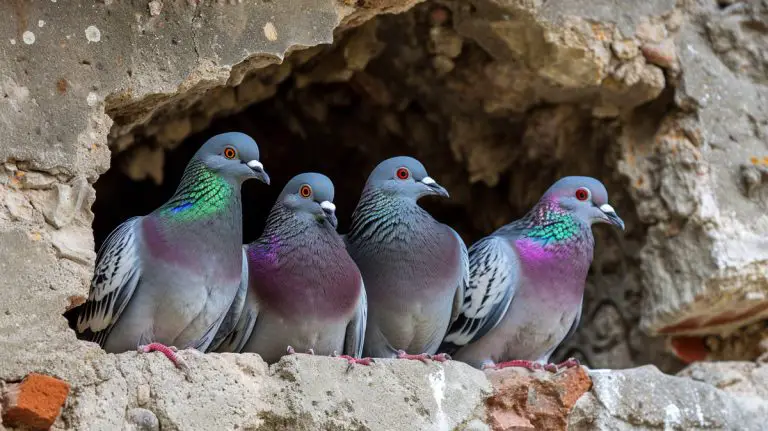When Can Baby Pigeons Feed Themselves? Everything There Is About Baby Pigeons
Just like other baby birds, baby pigeons are reliant on their parents as hatchlings. They are protected and fed by their parents until they can fend for themselves. The time it takes for them to become self-reliant is 4 to 6 weeks.
So, when can baby pigeons feed themselves? It takes approximately 2 weeks or 21-25 days. First 5 days, they will not eat anything else besides crop milk. And normal pigeon foods are considered dangerous for them.
But baby pigeons can be handled by human hands too. For that, you would need adequate knowledge of pigeon handling. We will cover various things related to pigeon handling here. Stay with us and keep reading.
When Can Baby Pigeons Feed Themselves?
Baby pigeons feed themselves when they become a little mobile and completely stop relying on crop milk. That happens after the first 2 weeks. Before that, they mostly sleep and chirp for food from their parents.
Now crop milk is a mixture of food that is rich in nutrition and food that come from the crop. The crop is the place where a bird stores its food. It is produced by adult pigeons.
The hatchlings cannot survive the first 5 days without this liquid substance. It makes them strong and helps them slowly stop relying on their parents for food.
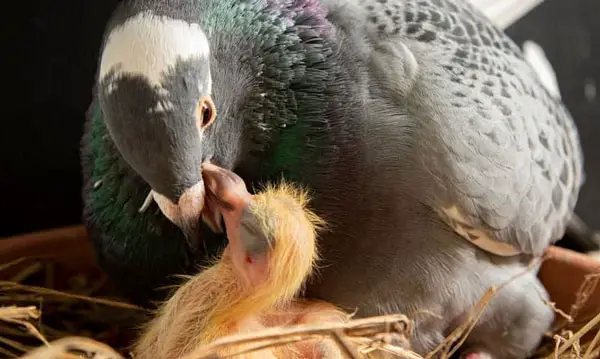
In those first few days baby pigeons cannot eat anything solid and if they do it is life-threatening for them. However, that changes when they start eating by themselves. So, they can consume normal pigeon foods like worms, grains, etc after 21-25 days.
Normally as a hatchling, baby pigeons would be fed 4 to 6 times. When they start eating by themselves or turn into fledglings, they eat twice a day.
Can Baby Pigeons Survive Without Parents?
No. The possibility of baby pigeons surviving without parents is close to zero unless they receive external help. Abandoned pigeon hatchlings are often raised by humans and they grow up to be healthy adult pigeons.
However, pigeons rarely abandon their babies. Sometimes, it might seem like a nest is abandoned but the parents might be close and looking for food. But if the parents die from a predator attack or there is human intervention in the nest, the babies can be abandoned.
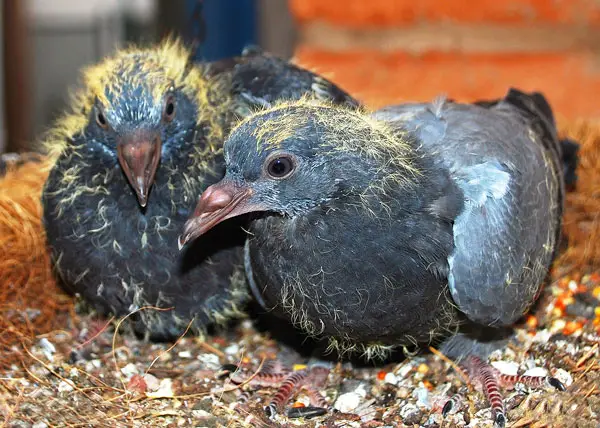
The difficulty of raising abandoned babies depends on their age. If the babies are fledglings, it will be quite easy. On the other hand, if they are hatchlings, it would be quite taxing.
How To Handle Baby Pigeons?
A baby pigeon can be hard to take care of because they need constant care and attention.
- A pigeon hatchling needs to be fed 4-6 times a day. That is a challenging task and they can only be fed liquid when they are a few days old.
- Naturally, it is crop milk, but there are also artificial alternatives.
- And the alternatives have to be fed with a small syringe.
- Pigeon parents make sure the food reaches the baby’s crop. So, to make sure that happens, a syringe or a dropper is a must.
Watch this video for a better understanding here;
- The babies need to be fed at the right time and overfeeding can be dangerous. So, check up on them constantly.
- And when the crop seems a little full stop feeding.
- The babies also need to be kept in a warm environment.
- If it is summer, wrapping them with clothes would be enough. But be sure to keep them in well-ventilated boxes.
- Make sure to keep the temperature around 26-32 degree Celsius (78-89 Fahrenheit).
- In winter, bulbs and heaters must be used to keep the temperature around that mark.
Crop Milk Alternatives
Crop milk is an essential part of a baby pigeon’s diet. If you are handling a baby pigeon, you need an alternative that can be fed to the bird first 5 days. And baby bird formula is a good alternative.
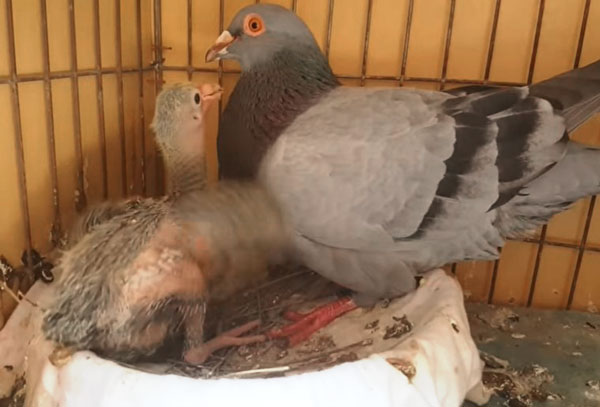
- Baby bird formulas such as First Formula by MorningBird, Kaytee Exact Hand Feeding, etc, are good options.
Mix them with water and make a thin mixture for the baby pigeons. Syringe feed the formula 4-6 times daily. Gradually thicken the mixture after the first 5 days.
- There is another alternative that is scientifically supported. It is the Mac milk formula created by Astrid MacLeod and Janine Perlman.
The formula goes like this:
| Ingredients | Amount |
|---|---|
| Strained Chicken Baby Food | 1 Jar (71 grams) |
| Hard-boiled Egg Yolk | 1 (16.6 grams) |
| Tablespoon Low-fat Yogurt | 1 Tablespoon (15.3 grams) |
| Corn Oil | ¼ Teaspoon (1.13 grams) |
| Calcium Carbonate | 247.6 mg |
| Cod-liver Oil | 2 Drops (From Gel Cap) |
| Vitamin E | 1 Drop (Diluted 1:10 in Corn Oil) |
| Vitamin B complex | 1 Small Pinch |
| Vitamin C (ascorbic acid) | 25 mg |
For birds that are 1-3 days old, use digestive enzymes. Here’s what you need to do;
- Mix all the ingredients in a blender
- Wait for half an hour so the enzyme can break down the food
- Warm it to a temperature that is okay as your wrist temperature, then feed
Baby Pigeon Diseases
There are a few common diseases for pigeons. These can also affect babies. The most common ones are
- Canker
- Worms
- Paratyphoid, etc.
The symptoms differ, but they all cause unusual weight loss, loss of appetite, and droppings that look concerning.
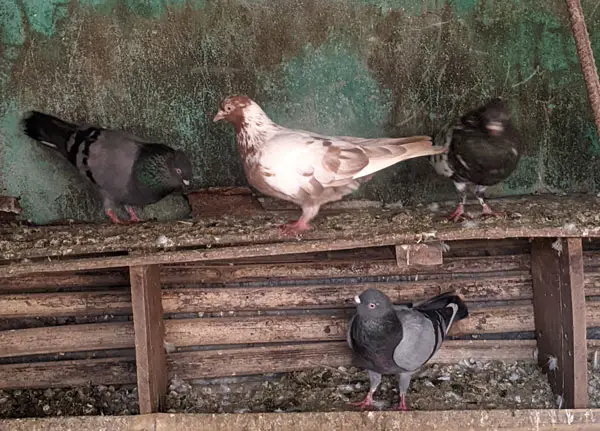
To deal with diseases when anything unusual is spotted the bird should be taken to the veterinarian.
Some diseases have vaccines. For example Paramyxovirus. So, the vaccines should be administered as early as possible.
Keeping A Baby Pigeon Clean
A baby pigeon needs to be bathed once a week minimum. Normally parents groom the babies but in human care that changes. So, non-medicated pet shampoos work well.
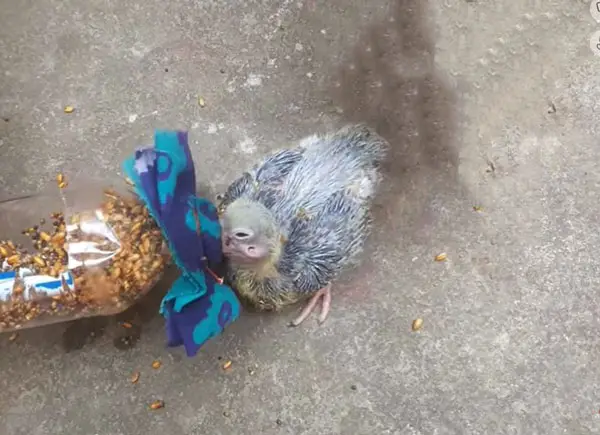
- Just dampen a soft cloth or paper with shampoo and warm water.
- Then rub the stained feathers gently to clean them.
- After that take another clean wet cloth and dab the feathers.
- Avoid the face and repeat the process whenever the baby pigeon needs cleaning.
FAQs
Read the section below for further information on baby pigeons.
Yes, baby pigeons can be overfed. For this reason, you should feed them 4-6 times as a hatchling. The crop of a baby pigeon is visible and it should help discern if they are full or not. The rule of thumb is to stop feeding when the crop seems three-quarters full of liquid.
Yes. Many animals can harm baby pigeons. A house cat is also considered dangerous for them. Naturally in the wild birds of prey, snakes, etc. are their natural enemies. So, if you are taking care of them keep them in a high place and away from your pet cat.
Avocados would be on top of the list of potentially toxic foods for birds. Aside from that there is fat, caffeine, chocolate, salt, onion, garlic, etc. So, there is a long list of food that can be dangerous for a baby pigeon.
Conclusion
For a quick recap, when can baby pigeons feed themselves? The answer is after almost 2 weeks or 21-25 days. In human care, many things change from food to caring. There are also many things to consider and to be careful about.
If baby pigeons are cared for properly, they can grow up to be healthy as naturally raised ones. So, there is no need to worry and information is the key to raising them well. Keep reading this post to boost your confidence in this regard.
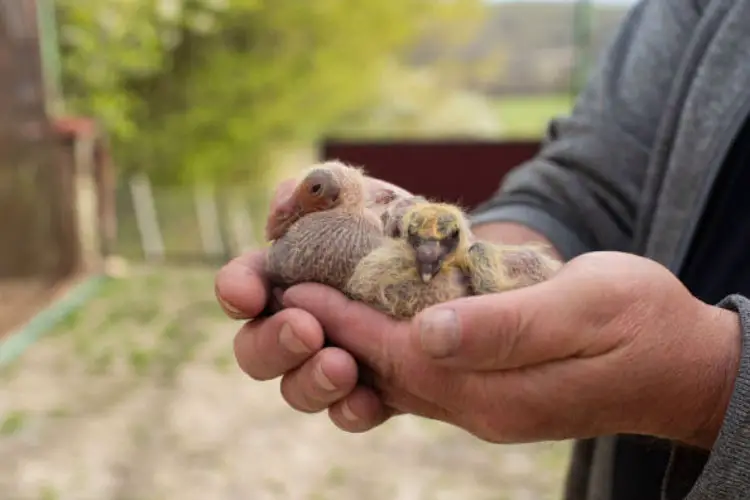
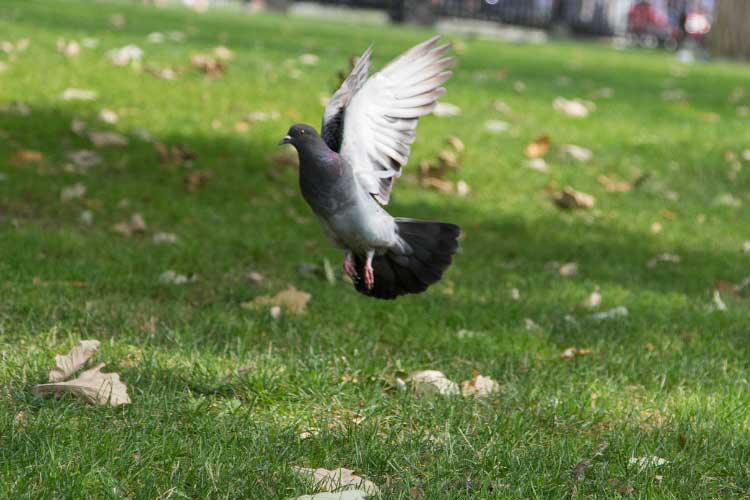
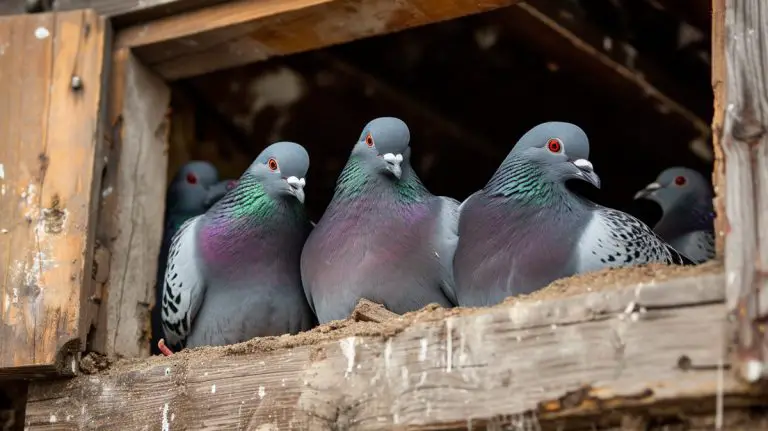
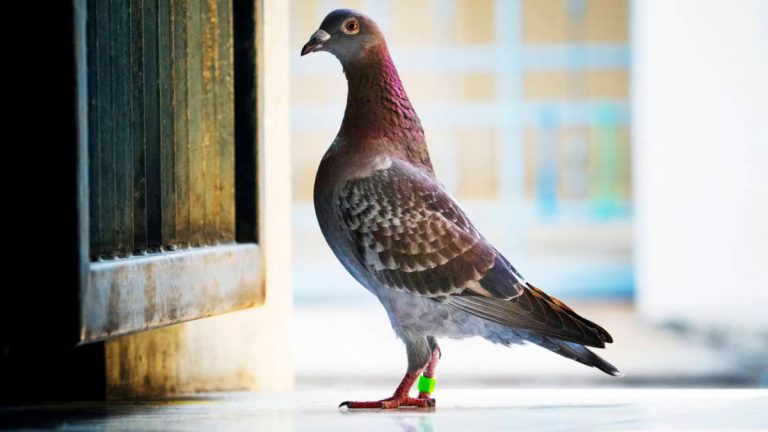
![Do Pigeons Eat Mice? [Everything You Need To Know]](https://avicultureblog.com/wp-content/uploads/2023/01/Do-Pigeons-Eat-Mice.jpg)

